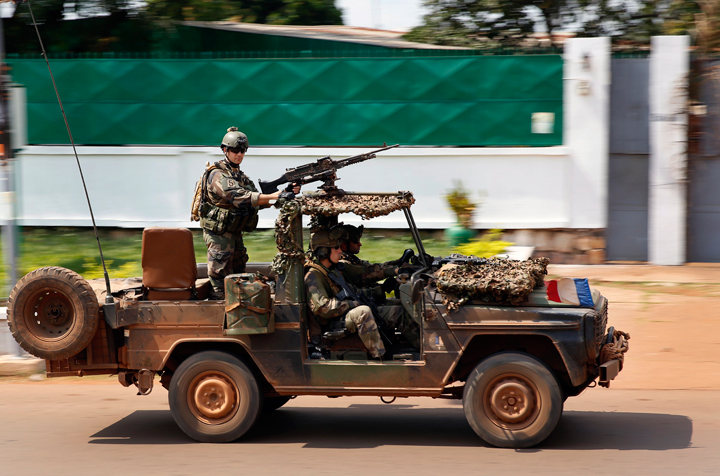The U.N. Security Council authorized increased military action by France and African troops in the Central African Republican to try to end near-anarchy amid an upsurge in Muslim-Christian violence, killings, torture and rapes.

The council unanimously approved a French-sponsored resolution Thursday aimed at restoring security and protecting civilians in the landlocked country.
The resolution authorizes the deployment of an African Union-led force for a year with a mandate to use “appropriate measures” to protect civilians and restore security and public order. The AU force, known as MISCA, is expected to increase its troop strength from about 2,500 to 3,500.
READ MORE: Central African Republic’s ‘forgotten human rights crisis’ worsening
The resolution also authorizes French forces, for a temporary period, “to take all necessary measures” to support MISCA.
France promised last week to send 1,000 troops to the Central African Republic following a warning from French Foreign Minister Laurent Fabius that the former French colony “is on the verge of genocide.” The Defence Ministry has said about 600 troops are in the country.
France’s U.N. Ambassador Gerard Araud told the council after the vote that “people have been terrorized by militia carrying out atrocities” and warned that the country “is likely to fall apart in mass atrocities.”
“History demands us to avoid the worst,” he said, welcoming the robust mandate for the African and French troops.
Whether the French and African forces can save lives largely depends on how far the foreign soldiers venture outside the capital, Bangui, where gunfire was heard Thursday morning, and into the lawless provinces. That’s where mostly Muslim rebels have been attacking Christian villages. Christian militias, known as anti-balaka, recently have launched retaliatory attacks, forcing thousands of civilians to take refuge in churches and mosques.
The resolution welcomes Secretary-General Ban Ki-moon’s intention to prepare for the possible transformation of MISCA into a U.N. peacekeeping operation. It asks the U.N. chief to provide recommendations for the possible transformation within three months. The council also asked the secretary-general to rapidly establish an international commission of inquiry to investigate allegations of rights abuses.
The resolution also imposes an arms embargo on the Central African Republic for a year and orders all countries to ban the sale or transfer of arms, ammunition, military equipment, spare parts and technical assistance and training.
The country’s chaos started late last year when rebel groups joined forces to form the coalition known as Seleka. In March, the rebels overthrew the president and installed their leader in power. But President Michel Djotodia now exerts little control over the renegade fighters in the provinces, most of whom are Muslim and who are accused of committing atrocities and forcibly recruiting child soldiers.
The International Crisis Group think-tank warned this week that the situation on the ground is deteriorating at a much faster pace than the international response is mobilizing and that the Central African Republic is staring “into an abyss of potentially appalling proportions.”



Comments